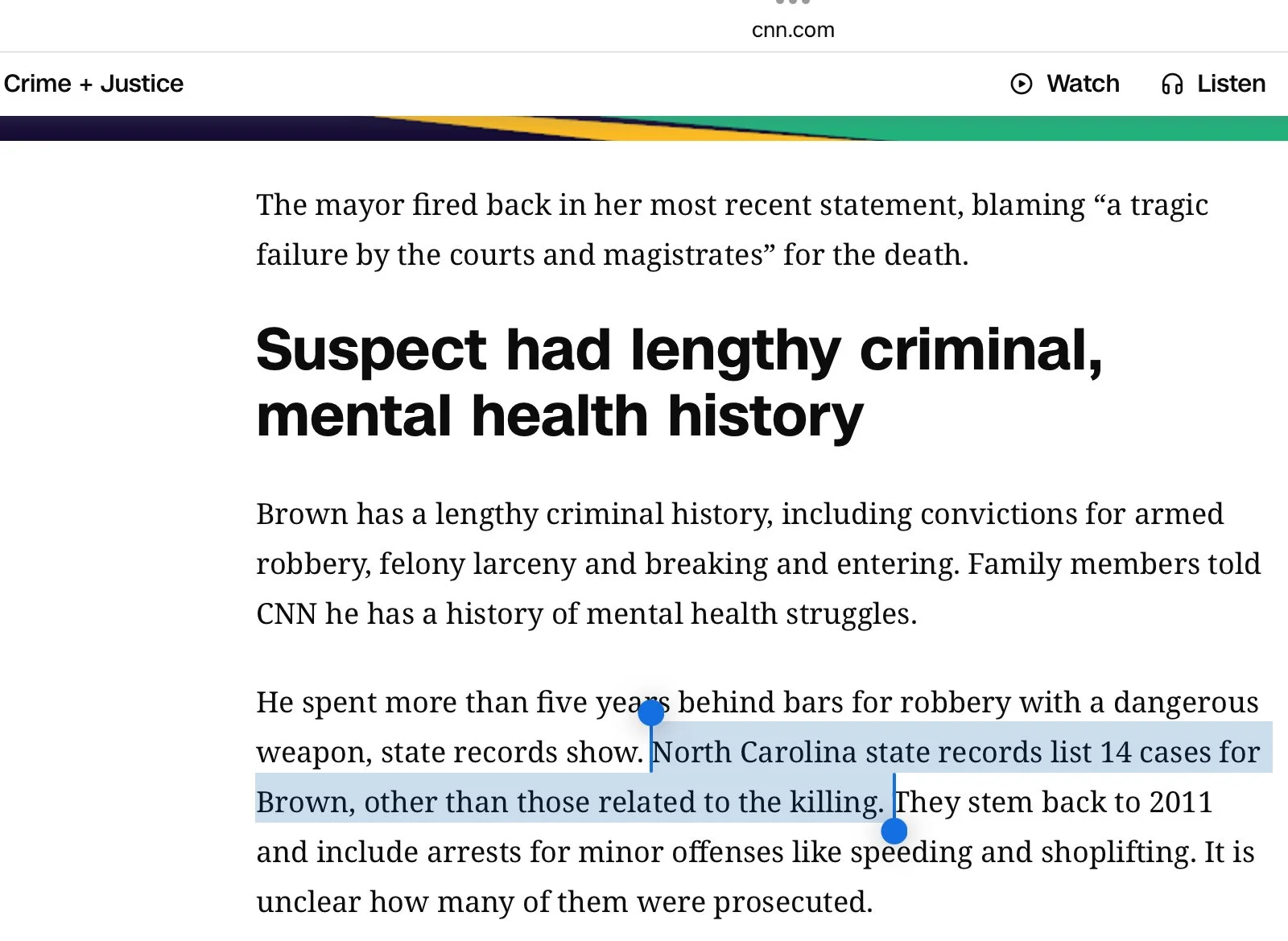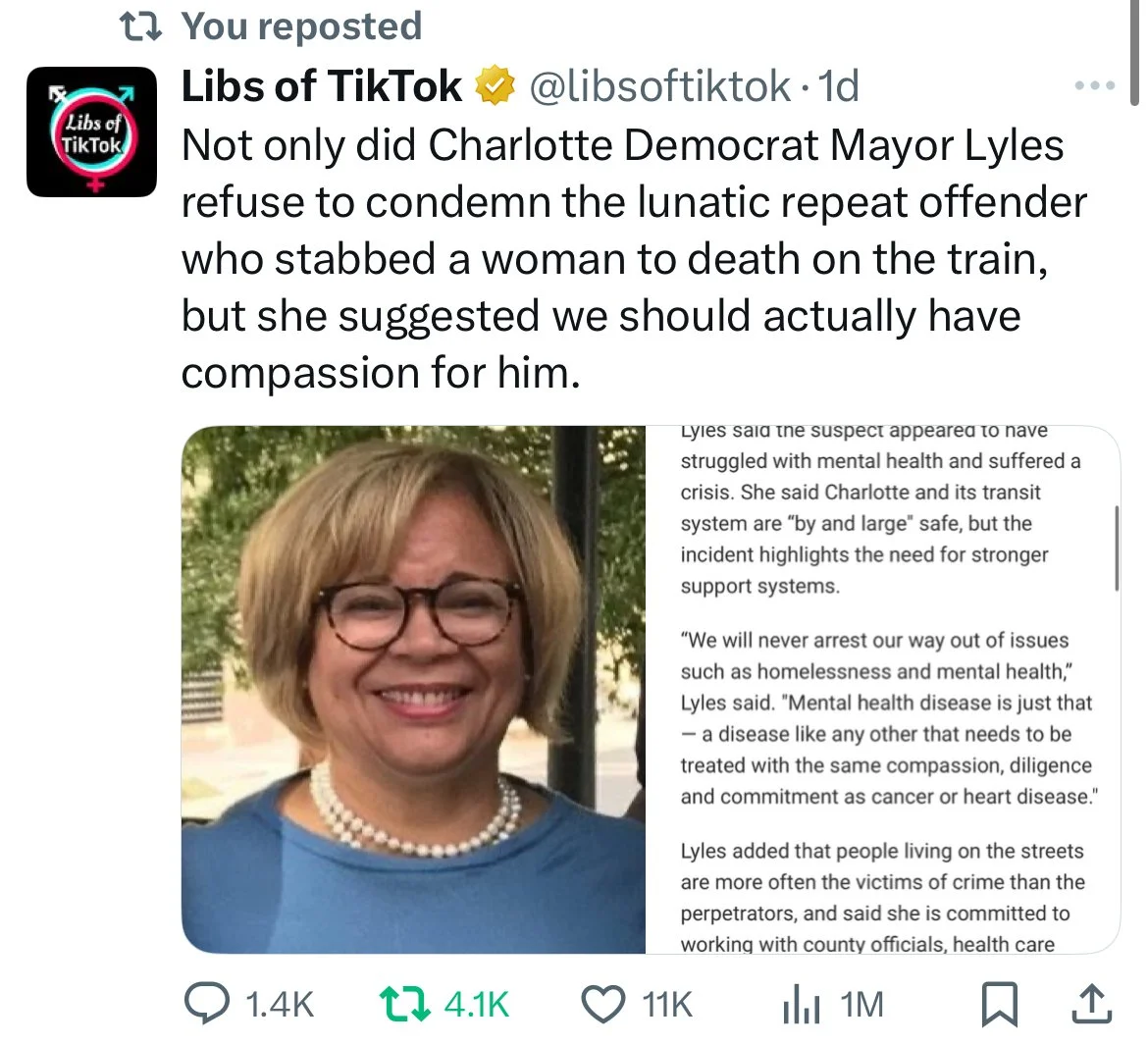The Ideological Blind Spot of the Extreme Left: Why Habitual Violent Offenders Should Not Be Released on Psychiatric Grounds
Mental Illness and Criminal Responsibility: Why Habitual Violent Offenders Should Not Be Released on Psychiatric Grounds
by Carl J Chan
In criminology and criminal law, it is well established that the presence of mental illness does not automatically exempt an individual from criminal responsibility. While millions of people live with psychological disorders, the overwhelming majority do not commit violent crimes, and those who do often act with full awareness of their actions. The legal principle of mens rea—the mental state necessary to form intent—remains fundamental to determining culpability.
The recent case of DeCarlos Brown Jr., a repeat violent offender in Charlotte, North Carolina, tragically illustrates the dangers of releasing high-risk individuals on psychiatric or procedural grounds. Despite his record of fourteen violent crimes, including armed robbery, Brown was released by a judge earlier this year. Weeks later, he fatally stabbed Iryna Zarutska, a 23-year-old Ukrainian refugee, in a seemingly random attack aboard a Charlotte light rail train. This case highlights the urgent need to balance mental health considerations with the criminological realities of recidivism and public safety.
Criminal Responsibility and Mental Illness
U.S. courts have long recognized that mental illness alone is insufficient for a successful insanity defense. Under the M’Naghten standard and related doctrines, defendants must prove that they did not comprehend the nature or wrongfulness of their actions. In practice, this threshold is rarely met. Crimes such as armed robbery—of which Brown was previously convicted—require deliberate actions: selecting a target, threatening violence, and seizing property. Such behavior demonstrates conscious intent, not uncontrollable compulsion.
Criminological theories reinforce this understanding. Rational choice theory argues that many offenders, even those with mental illness, weigh risks and rewards before acting. Control theoryemphasizes that repeated criminality stems from weak social bonds and poor self-regulation rather than purely psychiatric causes. Brown’s long criminal record exemplifies this: a consistent pattern of violent behavior over many years, not an isolated psychotic break.
The Case of DeCarlos Brown
Brown’s history spans more than a decade, including convictions for armed robbery, assault, and repeated misuse of emergency services. In January 2025, Magistrate Judge Teresa Stokes released him without bail based only on a written promise to appear in court—even though Brown had previously displayed erratic behavior, claiming a “man-made” material controlled his body.Critics now question whether the judge’s dual role at a local treatment facility created a conflict of interest in her decision-making.
The consequences were catastrophic. On August 22, 2025, Brown fatally stabbed Iryna Zarutska, a refugee from Ukraine who had fled war in search of safety. The attack, captured on surveillance cameras, was random and unprovoked. It has since sparked outrage nationwide. Online fundraisers for Brown’s legal defense were condemned and removed, while donations for Zarutska’s family have surpassed $79,000. Even Charlotte Mayor Vi Lyles faced backlash after initially framing the incident as a failure of the mental health system and urging compassion for the offender, rather than condemnation of his actions. Only later, under public pressure, did she call for stricter laws against repeat offenders and increased transit security.
Criminological Implications
From a criminological standpoint, the Brown case underscores several key lessons:
1. Prior Violent Conduct Predicts Future Violence: Empirical research consistently shows that a history of violent crime is the single strongest predictor of recidivism. Brown’s fourteen prior offenses placed him in the highest-risk category.
2. Systemic Failure of Risk Assessment: Releasing him on a “written promise” disregarded both criminological evidence and practical risk management. Judges must weigh psychiatric evaluations alongside objective measures of public danger.
3. Mental Illness as Complication, Not Excuse: Brown’s schizophrenia diagnosis may explain aspects of his behavior, but it does not erase his capacity for deliberate violence. Proper treatment should be delivered in secure forensic facilities—not through unconditional release.
4. Public Safety vs. Compassion: While addressing mental illness in the justice system is important, misplaced leniency undermines deterrence, erodes community trust, and, as this case shows, can lead to preventable tragedies.
Policy and Ethical Considerations
The Brown case has reignited debates about bail reform, judicial discretion, and the role of mental health in criminal justice. Critics argue that releasing repeat violent offenders on minimal conditions betrays the state’s responsibility to protect its citizens. Moreover, when judicial decisions appear influenced by conflicts of interest—as alleged in Judge Stokes’ case—the legitimacy of the justice system itself comes into question.
Ethically, society must uphold two commitments simultaneously: compassion for those with mental illness and protection of the innocent. Specialized forensic hospitals or secure treatment facilities can fulfill both obligations. What must be avoided is the false compassion of releasing dangerous individuals into the community without adequate safeguards.
The Ideological Blind Spot of the Extreme Left
What this case also exposes is a troubling pattern in extreme left ideology: the reflexive prioritization of compassion for offenders over justice for victims. When Charlotte’s mayor initially suggested sympathy for Brown while saying little about the slain refugee, it epitomized this inversion of moral concern. By framing violent offenders primarily as victims of systemic failures, radical progressive rhetoric erases the humanity of those they actually harmed.
This mindset undermines deterrence, disrespects victims, and ultimately endangers public safety. True justice requires compassion with boundaries: treatment for those who suffer from illness, but accountability for those who repeatedly and consciously choose violence. When ideology blinds leaders to that balance, it is not only unjust but deadly.
The tragedy of Iryna Zarutska’s death exposes the grave consequences of ignoring criminological evidence in favor of procedural shortcuts or misplaced leniency. DeCarlos Brown’s record of armed robbery and fourteen violent crimes already proved his capacity for deliberate harm. His release on psychiatric grounds, followed by the killing of a refugee, represents not just the failure of one judge but a broader failure of the justice system to integrate mental health considerations with public safety.
Justice requires distinguishing between mental illness that truly incapacitates responsibility and patterns of conscious, repeated violence. Failing to make this distinction endangers society and dishonors victims who sought only the safety and freedom promised by the law. And when leaders echo extreme ideological narratives that favor offenders over victims, they further deepen the injustice.

